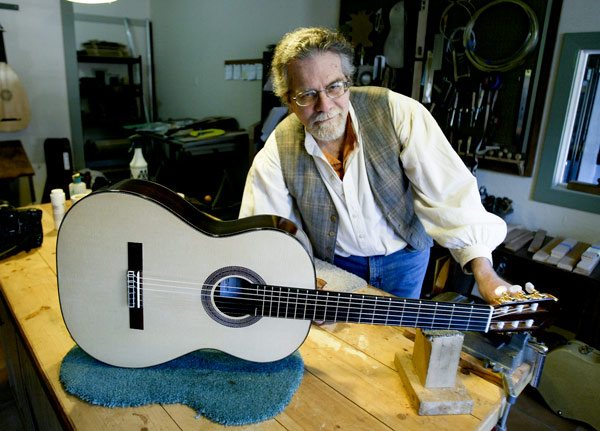Editor’s Note: The Island Treasure awards, established in 1999, honor those who have made outstanding community contributions in the area of the arts or humanities on Bainbridge Island.
Sometimes when Alan Simcoe stands at his workshop inside Village Music, he’ll become aware of passers-by who have paused.
These visitors, taking in the Tudor-inspired quaintness of Lynwood Center, have stopped at the large windows to gaze in at the instrument-maker while he works.
“It’s kind of like it’s Disneyland, and I’m one of the exhibits,” he said. “And that’s fun, I guess. That’s fine.”
Simcoe offers a similarly affable yet circumspect take on his newly bestowed status as a 2009 Island Treasure. The awards, established in 1999, honor those who have made outstanding community contributions in the area of the arts or humanities.
Sure, the life and work Simcoe has crafted for himself – musician, teacher, instrument-maker-and-seller and community music advocate – has a Renaissance quality. But he’d expect anyone else out there to just do what they do, and try to do it as well as they can.
Village Music, which Simcoe established in 2003, houses all the evidence of his trade. It’s got a storefront where he sells instruments. It provides teaching space.
He also has access to rehearsal space where he can jam with the informal community band that he formed with artist-percussionist Ian Turner, the West End Caribbean Ensemble Workshop.
And – the most novel endeavor to those passers-by – he builds stringed instruments, from classical guitars to lutes to parlor guitars and beyond.
Simcoe built his first guitar in 1992 or 1993, a project that was a long time coming. As a guitar performance student in the 1970s, he worked part-time in an instrument shop doing repairs on other people’s smashed instruments. He got the urge to build, but music school, and life, took up a lot of energy.
He allowed his coursework to travel a long arc, engaging in a series of day jobs, including work as a college-level music instructor, as he built a young family. He calls it “a part-time life.”
At 40, “What do I want to be when I grow up?” became a more insistent question. He knew he wasn’t a concert performer, and he knew he wasn’t an academic. He wanted a viable financial venture, “a normal activity.” Years of playing and exposure to those who played – not to mention their smashed guitars – had instilled in him a conviction that “the artistic life doesn’t feel like real life.”
“And then I remembered that I really wanted to build instruments,” he said. “It took me all of 21 seconds. And I went, ‘Done.’”
When Simcoe thinks about music-making, his role in the Bainbridge arts community, and this whole treasure thing, he refers to a 16th century music pamphlet designed with four sheets, one facing each direction. The design enabled the musicians to play collectively, while maximizing the possibility of each playing to his own best ability.
“Music-making,” Simcoe said, “is first and foremost a social endeavor.”
So like an instrument crafted to create a balanced sound, on Bainbridge and in Village Music, Simcoe has tapped into a working, artistic and social existence that enables him, as he put it, “to do the real stuff” – applying all the skills and loves he’s picked up and nurtured along the way.
“It feels like the best thing I’ve done so far,” he said. “As much as I spend my entire waking life here, it’s not a bad place to be.”
Making that which makes music.



